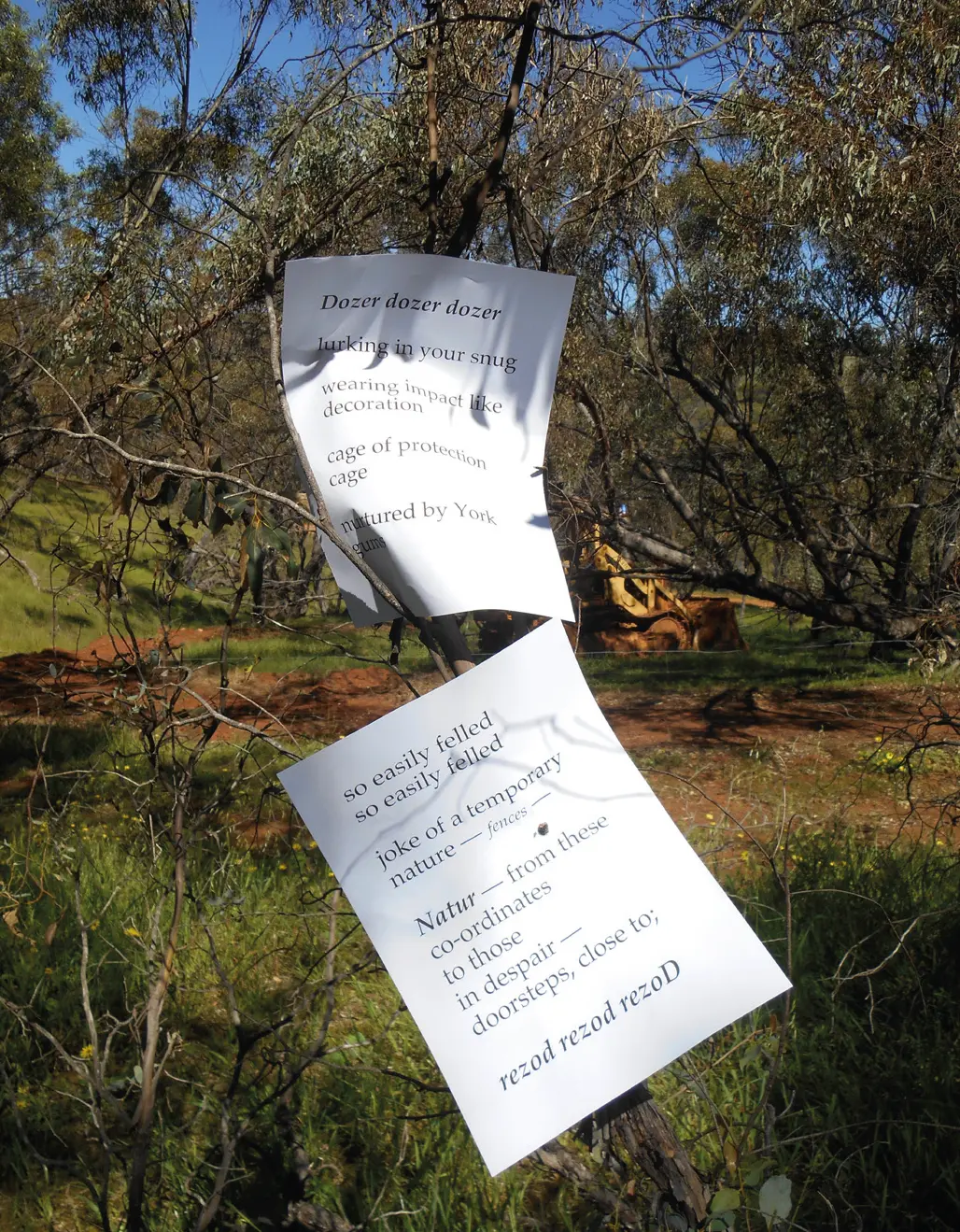1 ...6 7 8 10 11 12 ...25 Where I am going with this is into the heart of protest and how protest actions are communicated and engendered—now largely via Facebook, Tweets, and other social media via ‘devices’. We are witnessing the destruction of rare bushland and wetlands at Beeliar in Perth, Western Australia, and are part of a multitudinous voicing of opposition to abuse of the biosphere and locality, abuse committed by a Western Australian government hellbent on proving power by enforcing a toll highway that is seen by many, including town planners, as a ‘white elephant’. In witnessing this, I have seen desperation and trauma lead individuals and groups to deploying all non-violent methods available to them in an effort to stop the bulldozers.
There have been legal actions, chants, yelling, the holding of protest signs, the massing of protesters to block machinery, individuals locking-on to equipment, tree-climbing and tree-sitting, poetry and music and art being employed as protest tools, and innumerable articles and essays and radio interviews pointing out the destructive wrongs of the government’s actions.
In response to all this, we have seen hundreds of police deployed, and often quite aggressive retaliations to these protests. In many cases, the state has crushed and traumatised the protesters, over-riding all, and evoking signs and realities of a police state in which the constabulary become an extension of government policy. Nonetheless, this ‘Roe 8’ protest is much documented and is ongoing. The damage inflicted by the government and its ‘partners’/contractors from ‘private industry’ has been extreme, with obvious trauma to the land itself and equally obvious trauma to the people who care about that land (in many ways, it is akin to the psychological trauma inflicted by war—and yes, it is that brutal, and we need to understand this if we are to appreciate the serious consequences of such acts of environmental devastation).
The destruction of habitat, the wiping-out of endangered animal and bird species, of rare flora, and the abuse of Noongar boodja [Country], are an extension of the state’s remorseless attack on habitat and belonging throughout Western Australia, and there are numerous examples of this across the whole of Australia. I need not point out that the sun shines in a disturbed way on such abuses around the world as it works its way remorselessly ‘round’, witness to these serial and parallel desecrations.
Yet the very subjectivity that allows us personally to release and make collective bonds inside and outside personal cultural norms in order to resist such abuse, is compromised by the social media that have become pivotal in these resistances. As with the computer I type this on (a very old one I struggle to maintain, resisting the ‘outmoded’), the devices we use to communicate our actions, to draw the soul into the materiality of resistance, come at a cost that equates to what we are protecting. The rare earths that go into making a phone come from somewhere, and the destruction in mining them is massive. The power used. The psychologies of indifference behind the industries that manufacture hardware and software. I don’t need to list the causes and effects; they are well documented.
Nothing seems to be able to stop the juggernaut. In the same way that tyrants thrive in the late-capitalist Petri dish, so does the technology that has become synonymous with exploitation and resistance at once. It is a universal that opens lines—often angry and disrupted lines—across cultural difference, and allows access not only to ‘information’, but to the very essence of a constructed, publicised self. In this, cultural identity is diluted and fused with consumerism. Ideology is now consumerism, and inflections of control (from the self-proclaiming ‘free’ societies to dictator pariah states) are managed through access to devices/gadgets and the ‘freedom’ to use them.
To stop an oppressive government in a ‘free society’, stop consuming. Trump and May and Turnbull et al. ultimately succeed because we purchase. Even Stalin aimed for five-year plans that would (theoretically and eventually) resolve consumerist urges, and this is at the basis of all population buying-offs. I ask my fellow protesters—would you agree to not having phones (ever), in exchange for the wetlands? Some would genuinely answer yes, and mostly we can tell who they are because they make their difference from ‘society’ clear in many ways. Others would say yes on principle, but most would feel compelled by ‘necessity’ if nothing else, to decline.
This is an argument not of convenience but of syntax—if we don’t disrupt and change the way information flows, we will consume right to the core of the planet and the sun won’t be able to help us. We are dealing with notions of alternative facts and alternative truths at present, but control of media has always meant that—you don’t think Goebbels was for the free-flowing supply of ‘facts’, or that Stalin wanted the truth out on radio and in newspapers at all costs?
Of course not. But now we delude ourselves into thinking ‘freedom’ and ‘liberty’, which have been handed to us via the military through the internet, via the exploitation of Global South communities, via the mass destruction of habitat, have meant that we ourselves control our own access to information. And thus ‘armed’ with that information we become powerful ‘selves,’ and through this apparent empowerment can make choices of connectivity (the old collectivity ) to increase our group RAM? This is, disturbingly, a rerouting of the syntax of the self and the group into a new conservative prosody, into a compliance to company and state. We have given our liberties away, and paid to do so at the shop counter (increasingly online).
I laugh sadly as I see the increased sales of George Orwell’s 1984 —written by one who spied on and sold out the left—in the context of the horrors of language being altered to brainwash, when every Tweeter (say no more, man in the high tower!), and every Instagrammer plays language (textually or visually) many times a day in order to bend the semiotics of appearances , to contribute to the brainwashing (so often while denying doing so), to increase their own stake in the temporariness. It’s about increasing one’s space within time. We wear sunscreen to protect ourselves against a sun we have exposed ourselves to in ways John Donne never envisaged—and he was progressive !—and we filter our corporeal selves to reimagine what we understand as the essence of who we want to be—our identity— through filters.
In some ways, I am disturbed by the conservatism that could be read in this identification of the self as the route to destruction, but I reassure my radical self that it’s nothing to do with the essence of who we all are, as this ‘essence’ surely doesn’t wish to hide behind hypocrisies that will wipe all life from this planet sooner than we allow ourselves to think. In each of us is all place, all people, all selves: each of us has to act for the other whether we can see or hear them over phones. Just know we are out there, know in your relationship to sun, in language. Disrupt the lines of communication, don’t rejig them and contribute to the paradigm of consumerist denial.

The Bulldozer Poem
Bulldozers rend flesh. Bulldozers make devils
of good people. Bulldozers are compelled to do
as they are told. Bulldozers grimace when they
tear the earth’s skin—from earth they came.
Bulldozers are made by people who also want new
Читать дальше













